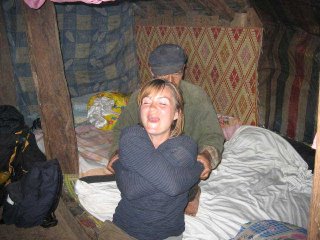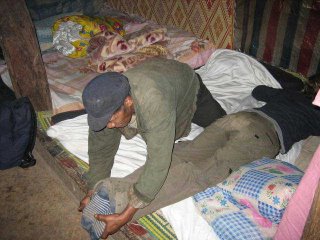Tropical Trek
We spent one day in a tropical city called Jinhong before setting off on our final trek. Jinhong is home to dozens of ethnic minorities. It felt as though we had left China. There was Dai script on street signs and storefronts, the people looked completely different, and although rice, meat and vegetables were the main staples, the flavors were refreshingly different---chicken stir fried with coconut milk or sticky rice served in a pineapple.
This is our guide, Ainipah, looking out over a village. Only 21 and he speaks the Bulan language, Mandarin and English (sort of). Ainipah left his Bulan village when he was 16 and moved to Jinhong to go to high-school.

On Day 1 the three of us hopped on a bus before sunrise and had a bumpy 3-hour journey to the starting point for our trek: a tiny town called Mengmeng (sounds like Mungmung).
In Mengmeng, we had a steaming hot bowl of noodles and then set off. For six long days, Ainipah led us through tea crops, coffee trees, banana trees and sugar cane. Some paths were so narrow and vegetated that if you followed too closely behind, you would be repeatedly whapped with leaves and smacked with branches.
Other paths led up the terraced hillsides with no escape of full sun exposure.
Every evening around 5pm, we would happen upon a village and Ainipah would go about finding a family willing to provide dinner, breakfast and a place to sleep. Most villages supported about 70 families.
 Fog filled the valleys every morning.
Fog filled the valleys every morning.
This man was tickled when Josh offered his headlamp. I think he was glad to take the heavy metal flashlight out of his mouth. Looks like it didn't taste very good.
Looks like it didn't taste very good.
Each home (made of bamboo and grass) is one large room built ten feet up off of the ground. There is a fire in the center of the house that has continued burning or smoldering since the day the house was completed and the family moved in. The room fills with smoke, but you get used to it and it keeps the mosquitoes away. (We did take Mefloquine to prevent Malaria just in case. There werenÂt any mosquitoes but we did have crazy and vivid drug induced dreams.)
Every night we sat down to a big meal of boney chicken (the heart and liver were proudly delivered to Josh's bowl) , a vegetable or melon soup and something or other that was pickled. Usually the men would join us a the table and encourage us to drink more of the homemade rice wine. The women never sit at the table. Ainipah says they always eatseparatelyy. They did make sure that our bowls were always full of rice and encouraged us to "eat slowly", "drink slowly", "walk slowly". I quite liked all that advice.

Josh and Ainipah after a particularly long day. This night we stayed with a family who had the newest house in the village--made of cinder block and plaster. It was our warmest and quietest night. No rats. No roosters.
These boys were excited to prepare one of their chickens for us.

Everyone lends a hand to get a house built in one or two days. We definitely slowed down progress for a few minutes.

Many of the villagers told Ainipah that we were the first foreigners they had ever seen in real life. Even though every family has a television, they sure were fascinated to see us up close and in person. Most everyone came out onto his or her bamboo porch to have a look. Young children stared at us agape, and, I thought, maybe a little frightened. According to Ainipah, they were all bewildered at why we would want to walk all day to the next village when we could take a tractor in this modern time.


 Pigs, chickens and water buffalo everywhere!
Pigs, chickens and water buffalo everywhere!

Our trek nicely coincided with passing through this Bulan village when they were hosting a big party to celebrate the opening of an outdoor museum.
There was quite a crowd, including some local government officials. Four moretravelerss (two Chinese men, a German woman and an Irishman) met us there to join the trek for the last three days.
 Every village that we came across had a temple for daily worship. Young boys become monks when they are 10 or 11 years old.
Every village that we came across had a temple for daily worship. Young boys become monks when they are 10 or 11 years old.
We had an unspoken agreement with these monks: We are tall and white, you are monks. Lets just stare for a while.
Ainipah cleaning up in a stream.

On our last night, the grandfather of this household gave each of us a massage. There was no choice in the matter. Without saying a word, he would enthusiastically point at you and motion over to a mattress on the floor. The massage was about three minutes long and the final touch was to crack your back: hands clamped behind you, he pushed out with his knees and pulled you back by your arms (see below).
That is an expression of pain and pleasure.




Fabian (the Chinese guy in black) thought he could hide, but the grandfather found him.
This is our guide, Ainipah, looking out over a village. Only 21 and he speaks the Bulan language, Mandarin and English (sort of). Ainipah left his Bulan village when he was 16 and moved to Jinhong to go to high-school.

On Day 1 the three of us hopped on a bus before sunrise and had a bumpy 3-hour journey to the starting point for our trek: a tiny town called Mengmeng (sounds like Mungmung).
In Mengmeng, we had a steaming hot bowl of noodles and then set off. For six long days, Ainipah led us through tea crops, coffee trees, banana trees and sugar cane. Some paths were so narrow and vegetated that if you followed too closely behind, you would be repeatedly whapped with leaves and smacked with branches.
Other paths led up the terraced hillsides with no escape of full sun exposure.
Every evening around 5pm, we would happen upon a village and Ainipah would go about finding a family willing to provide dinner, breakfast and a place to sleep. Most villages supported about 70 families.
 Fog filled the valleys every morning.
Fog filled the valleys every morning.This man was tickled when Josh offered his headlamp. I think he was glad to take the heavy metal flashlight out of his mouth.
 Looks like it didn't taste very good.
Looks like it didn't taste very good.Each home (made of bamboo and grass) is one large room built ten feet up off of the ground. There is a fire in the center of the house that has continued burning or smoldering since the day the house was completed and the family moved in. The room fills with smoke, but you get used to it and it keeps the mosquitoes away. (We did take Mefloquine to prevent Malaria just in case. There werenÂt any mosquitoes but we did have crazy and vivid drug induced dreams.)
Every night we sat down to a big meal of boney chicken (the heart and liver were proudly delivered to Josh's bowl) , a vegetable or melon soup and something or other that was pickled. Usually the men would join us a the table and encourage us to drink more of the homemade rice wine. The women never sit at the table. Ainipah says they always eatseparatelyy. They did make sure that our bowls were always full of rice and encouraged us to "eat slowly", "drink slowly", "walk slowly". I quite liked all that advice.


Josh and Ainipah after a particularly long day. This night we stayed with a family who had the newest house in the village--made of cinder block and plaster. It was our warmest and quietest night. No rats. No roosters.
These boys were excited to prepare one of their chickens for us.

Everyone lends a hand to get a house built in one or two days. We definitely slowed down progress for a few minutes.

Many of the villagers told Ainipah that we were the first foreigners they had ever seen in real life. Even though every family has a television, they sure were fascinated to see us up close and in person. Most everyone came out onto his or her bamboo porch to have a look. Young children stared at us agape, and, I thought, maybe a little frightened. According to Ainipah, they were all bewildered at why we would want to walk all day to the next village when we could take a tractor in this modern time.


 Pigs, chickens and water buffalo everywhere!
Pigs, chickens and water buffalo everywhere!
Our trek nicely coincided with passing through this Bulan village when they were hosting a big party to celebrate the opening of an outdoor museum.
There was quite a crowd, including some local government officials. Four moretravelerss (two Chinese men, a German woman and an Irishman) met us there to join the trek for the last three days.
 Every village that we came across had a temple for daily worship. Young boys become monks when they are 10 or 11 years old.
Every village that we came across had a temple for daily worship. Young boys become monks when they are 10 or 11 years old.We had an unspoken agreement with these monks: We are tall and white, you are monks. Lets just stare for a while.
Ainipah cleaning up in a stream.

On our last night, the grandfather of this household gave each of us a massage. There was no choice in the matter. Without saying a word, he would enthusiastically point at you and motion over to a mattress on the floor. The massage was about three minutes long and the final touch was to crack your back: hands clamped behind you, he pushed out with his knees and pulled you back by your arms (see below).
That is an expression of pain and pleasure.




Fabian (the Chinese guy in black) thought he could hide, but the grandfather found him.

0 Comments:
Post a Comment
<< Home